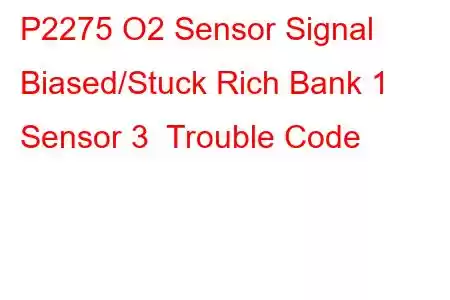P2275 O2 Sensor Signal Biased/Stuck Rich Bank 1 Sensor 3
OBD-II Trouble Code Technical Description
O2 Sensor Signal Biased/Stuck Rich Bank 1 Sensor 3
What does that mean?
This is a generic powertrain code, which means it covers all OBD-II equipped vehicles, 1996-newer. Auto brands may include but are not limited to VW, Honda, Dodge, Hyundai, Ford, GMC, Acura, etc. However, specific troubleshooting steps will vary depending on the vehicle.
This P2275 diagnostic trouble code (DTC) refers to the post-catalytic converter O2 (oxygen) sensor on bank #1, sensor #3. This post-cat sensor is used for monitoring the efficiency of the catalytic converter. The converter's job is to reduce emissions out the tailpipe. When the signal from the O2 sensor is detected by the PCM as being stuck Rich or biased Rich, this DTC is set.
The P2275 DTC refers to the second downstream sensor (after the second catalytic converter), sensor #3 on bank #1. Bank #1 is the side of the engine that contains cylinder #1.
This code is basically telling you that the signal put out by the particular oyxgen sensor is stuck rich (meaning too little air in the exhaust).
A typical oxygen O2 sensor:
Symptoms
Most likely you will not notice any drivability issues since this is not sensor #1. You will notice Malfunction Indicator Lamp (MIL) illumination. In some cases however, the engine may run rough.
Potential Causes
The causes for this DTC may include:
Contaminated or failed HO2S2 (Sensor 3) HO2S2 wiring/circuit problem Fuel pressure incorrect Faulty fuel injector Engine coolant leak Faulty purge solenoid valve PCM has failedDiagnostic and Repair Procedures
Visually inspect the wiring and connectors for corrosion, rubbed / chafed / bent wires, wiring pins bent/loose, burnt appearance, and/or crossed wires. Repair or replace as required.
Check for exhaust leaks or other problems, repair as necessary.
Using a digital volt ohm meter (DVOM) set to ohms, check harness connectors for resistance. Compare to manufacturer specifications. Replace or repair as required.
If you have access to an advanced scan tool, use it to monitor the sensor readings as viewed by the PCM (engine running, at normal operating temperature in closed loop mode). The rear heated oxygen sensor (HO2S) normally sees a fluctuating voltage between 0 & 1 volt, for this DTC you'll likely see the voltage "stuck" at 1V. Revving the engine should cause the sensor's voltage to change (react).
The most common fixes for this DTC seem to be either an exhaust air leak, a wiring problem with the sensor/wiring, or the sensor itself. If you replace the O2 sensor, buy an OEM one (manufacturer brand) for best results.
If you remove the HO2S oxygen sensor, inspect it for contamination from fuel, engine oil, and coolant.
Other troubleshooting ideas: Use a fuel pressure tester, check the fuel pressure at the Schrader valve on the fuel rail. Compare to manufacturers specification. Inspect the purge solenoid valve. Inspect fuel injectors. Inspect coolant passages for leaks.
Read: 21


